一般将来时,be going to,be to do,主将从现
- 格式:ppt
- 大小:575.00 KB
- 文档页数:2
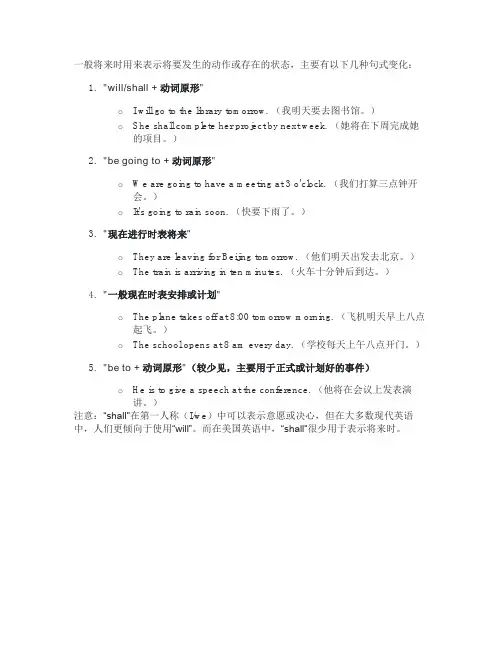
一般将来时用来表示将要发生的动作或存在的状态,主要有以下几种句式变化:1."will/shall + 动词原形"o I will go to the library tomorrow. (我明天要去图书馆。
)o She shall complete her project by next week. (她将在下周完成她的项目。
)2."be going to + 动词原形"o We are going to have a meeting at 3 o'clock. (我们打算三点钟开会。
)o It's going to rain soon. (快要下雨了。
)3."现在进行时表将来"o They are leaving for Beijing tomorrow. (他们明天出发去北京。
)o The train is arriving in ten minutes. (火车十分钟后到达。
)4."一般现在时表安排或计划"o The plane takes off at 8:00 tomorrow morning. (飞机明天早上八点起飞。
)o The school opens at 8 am every day. (学校每天上午八点开门。
)5."be to + 动词原形"(较少见,主要用于正式或计划好的事件)o He is to give a speech at the conference. (他将在会议上发表演讲。
)注意:“shall”在第一人称(I/we)中可以表示意愿或决心,但在大多数现代英语中,人们更倾向于使用“will”。
而在美国英语中,“shall”很少用于表示将来时。
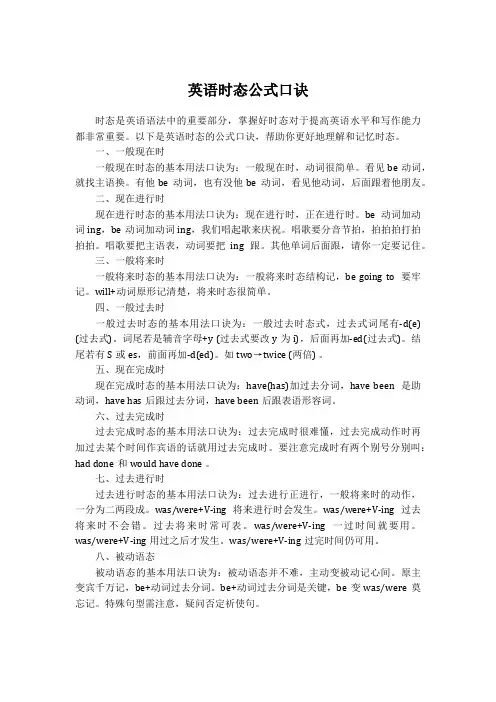
英语时态公式口诀时态是英语语法中的重要部分,掌握好时态对于提高英语水平和写作能力都非常重要。
以下是英语时态的公式口诀,帮助你更好地理解和记忆时态。
一、一般现在时一般现在时态的基本用法口诀为:一般现在时,动词很简单。
看见be动词,就找主语换。
有他be动词,也有没他be动词,看见他动词,后面跟着他朋友。
二、现在进行时现在进行时态的基本用法口诀为:现在进行时,正在进行时。
be动词加动词ing,be动词加动词ing,我们唱起歌来庆祝。
唱歌要分音节拍,拍拍拍打拍拍拍。
唱歌要把主语表,动词要把ing跟。
其他单词后面跟,请你一定要记住。
三、一般将来时一般将来时态的基本用法口诀为:一般将来时态结构记,be going to要牢记。
will+动词原形记清楚,将来时态很简单。
四、一般过去时一般过去时态的基本用法口诀为:一般过去时态式,过去式词尾有-d(e) (过去式)。
词尾若是辅音字母+y (过去式要改y为i),后面再加-ed(过去式)。
结尾若有S或es,前面再加-d(ed)。
如two→twice (两倍) 。
五、现在完成时现在完成时态的基本用法口诀为:have(has)加过去分词,have been是助动词,have has后跟过去分词,have been后跟表语形容词。
六、过去完成时过去完成时态的基本用法口诀为:过去完成时很难懂,过去完成动作时再加过去某个时间作宾语的话就用过去完成时。
要注意完成时有两个别号分别叫:had done和would have done 。
七、过去进行时过去进行时态的基本用法口诀为:过去进行正进行,一般将来时的动作,一分为二两段成。
was/were+V-ing将来进行时会发生。
was/were+V-ing过去将来时不会错。
过去将来时常可表。
was/were+V-ing一过时间就要用。
was/were+V-ing用过之后才发生。
was/were+V-ing过完时间仍可用。
八、被动语态被动语态的基本用法口诀为:被动语态并不难,主动变被动记心间。
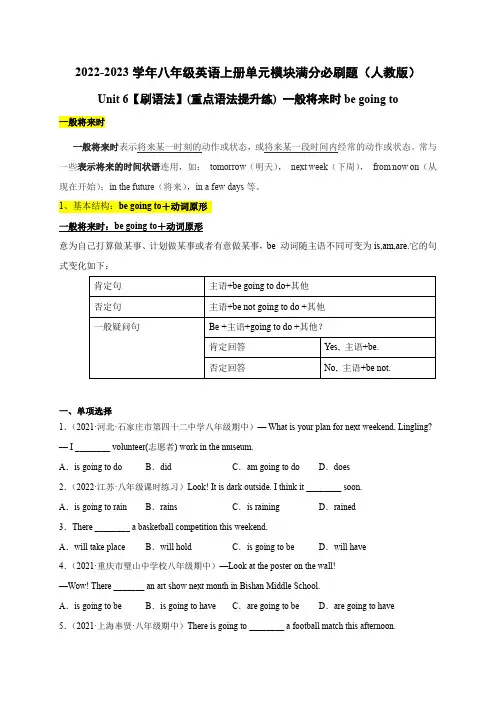
2022-2023学年八年级英语上册单元模块满分必刷题(人教版)Unit 6【刷语法】(重点语法提升练) 一般将来时be going to一般将来时一般将来时表示将来某一时刻的动作或状态,或将来某一段时间内经常的动作或状态。
常与一些表示将来的时间状语连用,如:tomorrow(明天),next week(下周),from now on(从现在开始);in the future(将来),in a few days等。
1、基本结构:be going to+动词原形一般将来时:be going to+动词原形意为自己打算做某事、计划做某事或者有意做某事,be 动词随主语不同可变为is,am,are.它的句式变化如下:一、单项选择1.(2021·河北·石家庄市第四十二中学八年级期中)— What is your plan for next weekend, Lingling?— I ________ volunteer(志愿者) work in the museum.A.is going to do B.did C.am going to do D.does2.(2022·江苏·八年级课时练习)Look! It is dark outside. I think it ________ soon.A.is going to rain B.rains C.is raining D.rained3.There ________ a basketball competition this weekend.A.will take place B.will hold C.is going to be D.will have4.(2021·重庆市璧山中学校八年级期中)—Look at the poster on the wall!—Wow! There _______ an art show next month in Bishan Middle School.A.is going to be B.is going to have C.are going to be D.are going to have 5.(2021·上海奉贤·八年级期中)There is going to ________ a football match this afternoon.A.have B.has C.is D.be6.(2021·山东济南·八年级期中)—What do you plan to do this weekend?—We ________ soccer. We play it once a week.A.play B.playedC.are going to play D.are playing7.(2021·广东·湛江一中培才学校八年级期中)There ________ a concert at 7:00 this evening.A.is going to have B.is going to be C.is having D.will have8.(2021·河北·石家庄市第二十八中学八年级期中)There ________ two new movies in Sunshine Movie Theater tonight.A.is going to have B.will have C.is going to be D.are going to be 9.(2021·河北·石家庄市第二十八中学八年级期中)—Shall we go to the museum tomorrow?—I’d love to, but I’m afraid I can’t. I ________ my grandparents.A.visit B.visited C.am going to visit D.is visiting 10.(2021·河北·石家庄市第二十五中学八年级期中)— Mom, I ________ my clothes when I come back home.— OK. You promise me.A.am washing B.am going to wash C.washed D.wash11.(2021·黑龙江·哈尔滨市第十七中学校八年级期中)—Are there any robots in your home now?—No, but there ________ a lot of robots in people’s homes ________.A.will be, 100 years ago B.are going to have, in 100 years C.are going to be, in 100 years 12.(2019·福建省福州第十九中学八年级期中)Look at those big black clouds. It ________ rain. Let’s hurry.A.must B.will C.would D.is going to 13.(2021·广东·东莞市新世纪英才学校八年级期中)________ your cousin ________ me next week? A.Is; going to visit B.Does; going to visit C.Is; goes to visit D.Does; goes to visit 14.(2018·广东·珠海市斗门区实验中学八年级期中)—My sister and I _________ the park this Sunday. Do you want to go with us?A.visit B.visits C.visited D.are going to visit 15.(2020·辽宁·灯塔市教师进修学校八年级期中)There is going to ________ a meeting the day aftertomorrow(后天).A.have B.be C.has D./二、完成句子16.——本周末打算去哪儿野餐,杰克?——玉湖公园。
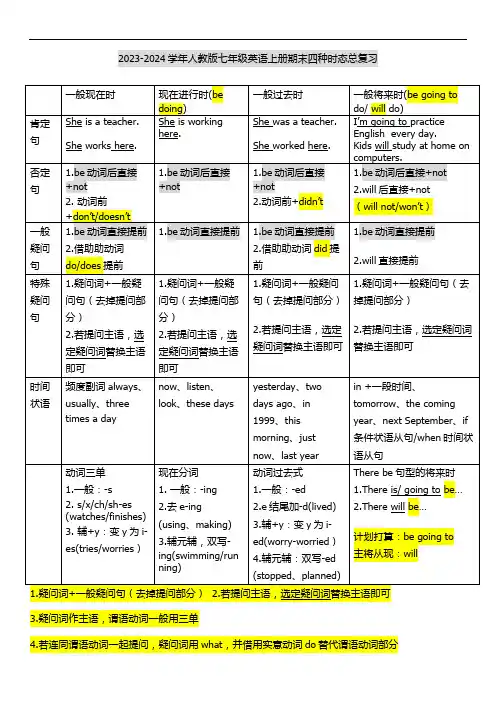
2023-2024学年人教版七年级英语上册期末四种时态总复习1.疑问词+一般疑问句(去掉提问部分)2.若提问主语,选定疑问词替换主语即可3.疑问词作主语,谓语动词一般用三单4.若连同谓语动词一起提问,疑问词用what ,并借用实意动词do 替代谓语动词部分一般现在时 现在进行时(be doing)一般过去时 一般将来时(be going to do/ will do)肯定句 She is a teacher.She works here. She is working here.She was a teacher.She worked here. I ’m going to practice English every day.Kids will study at home on computers.否定句1.be 动词后直接+not2. 动词前+don ’t/doesn ’t 1.be 动词后直接+not1.be 动词后直接+not2.动词前+didn ’t1.be 动词后直接+not2.will 后直接+not (will not/won ’t ) 一般疑问句 1.be 动词直接提前 2.借助助动词do/does 提前 1.be 动词直接提前 1.be 动词直接提前2.借助助动词did 提前1.be 动词直接提前2.will 直接提前特殊疑问句1.疑问词+一般疑问句(去掉提问部分)2.若提问主语,选定疑问词替换主语即可1.疑问词+一般疑问句(去掉提问部分)2.若提问主语,选定疑问词替换主语即可 1.疑问词+一般疑问句(去掉提问部分) 2.若提问主语,选定疑问词替换主语即可 1.疑问词+一般疑问句(去掉提问部分)2.若提问主语,选定疑问词替换主语即可时间状语频度副词always 、usually 、three times a daynow 、listen 、look 、these daysyesterday 、two days ago 、in 1999、this morning 、just now 、last yearin +一段时间、tomorrow 、the coming year 、next September 、if 条件状语从句/when 时间状语从句动词三单1.一般:-s2. s/x/ch/sh-es (watches/finishes)3. 辅+y :变y 为i-es(tries/worries )现在分词1. 一般:-ing2.去e-ing (using 、making)3.辅元辅,双写-ing(swimming/running)动词过去式 1.一般:-ed 2.e 结尾加-d(lived) 3.辅+y :变y 为i- ed(worry-worried ) 4.辅元辅:双写-ed (stopped 、planned)There be 句型的将来时 1.There is/ going to be … 2.There will be …计划打算:be going to 主将从现:will注意:动词原形四种情形:1.情态动词(can/may/might/have to/must/will/would/should/shall)+动词原形2.祈使句中,用动词原形3.助动词do/don’t/does/doesn’t/did/didn’t 后,用动词原形4.使役动词let/make/have sb. do注意:v-ing的三种情况1.现在进行时be doing2.介词+v-ing3.enjoy/miss/mind/finish/have fun/practice/keep/suggest/avoid/can’t help/consider/feel like/give up doing注意:主将从现主将从现主句一般将来时从句一般现在时will +动原if后引导的是从句动原/三单If it rains tomorrow, we will not go to the zoo.从句(现)主句(将)If he doesn’t come, I will phone/call him.从句(现)主句(将)Eg:肯定句: I’m going to practice basketball every day.否定句:I’m not going to practice basketball every day.一般疑问句:Are you going to practice basketball every day.特殊疑问句:1. 若提问主语,选定疑问词替换掉主语即可Who is going to practice basketball every day? (对I提问)2. 疑问词+一般疑问句(去掉提问部分)What are you going to practice every day? (对basketball提问)How often are you going to practice basketball? (对every day提问)What are you going to do every day? (对practice basketball提问)肯定句:Tom is going to move to Shanghai next year. (习题)否定句:__________________________________________.一般疑问句: ____________________________________________. 特殊疑问句:1. _______________________________________________________.2. _______________________________________________________. 3_______________________________________________________.4.______________________________Eg:肯定句: Robots will think like humans in the future.否定句:Robots won’t think like humans in the future.一般疑问句:Will robots think like humans in the future?.特殊疑问句:1. 若提问主语,选定疑问词替换掉主语即可what will think like humans in the future? (对Robots提问)2. 疑问词+一般疑问句(去掉提问部分)What will robots think like in the future? (对humans提问)When will robots think like humans? (对in the future提问)What will robots do in the future? (对think like humans提问)肯定句: Cities will be more crowded and polluted in 100 years.(习题) 否定句:__________________________________________.一般疑问句: ____________________________________________. 特殊疑问句:1. _______________________________________________________.2. _______________________________________________________. 3_______________________________________________________.Eg:肯定句: Tom visited his grandpa by train last week.否定句:Tom didn’t visit his grandpa by train last week.一般疑问句:Did Tom visit his grandpa by train last week.特殊疑问句:1. 若提问主语,选定疑问词替换掉主语即可Who visited his grandpa by train last week? (对Tom提问)2. 疑问词+一般疑问句(去掉提问部分)Who did Tom visit by train last week? (对his grandpa提问)when did Tom visit his grandpa by train ? (对last week提问)How did Tom visit his grandpa last week? (对by train提问)What did Tom do by train last week? (对visited his grandpa提问)肯定句:Tom went to Beijing with his friends yesterday? (习题)否定句:__________________________________________.一般疑问句: ____________________________________________. 特殊疑问句:1. _______________________________________________________.2. _______________________________________________________. 3_______________________________________________________.4.________________________________________________________.。
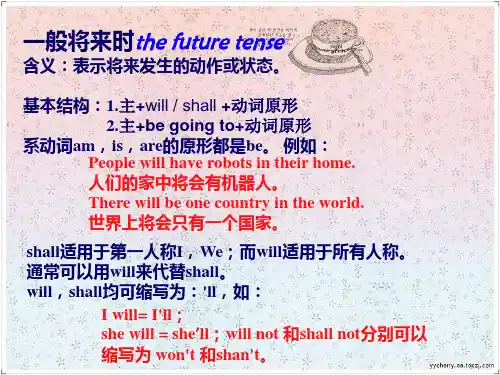
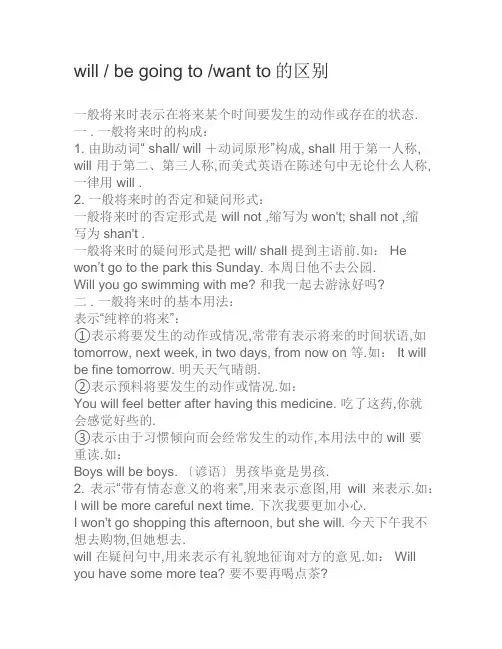
will / be going to /want to的区别一般将来时表示在将来某个时间要发生的动作或存在的状态.一 . 一般将来时的构成:1. 由助动词“ shall/ will +动词原形”构成, shall 用于第一人称, will 用于第二、第三人称,而美式英语在陈述句中无论什么人称,一律用 will .2. 一般将来时的否定和疑问形式:一般将来时的否定形式是 will not ,缩写为 won't; shall not ,缩写为 shan't .一般将来时的疑问形式是把 will/ shall 提到主语前.如: He won’t go to the park this Sunday. 本周日他不去公园.Will you go swimming with me? 和我一起去游泳好吗?二 . 一般将来时的基本用法:表示“纯粹的将来”:①表示将要发生的动作或情况,常带有表示将来的时间状语,如tomorrow, next week, in two days, from now on 等.如: It will be fine tomorrow. 明天天气晴朗.②表示预料将要发生的动作或情况.如:You will feel better after having this medicine. 吃了这药,你就会感觉好些的.③表示由于习惯倾向而会经常发生的动作,本用法中的 will 要重读.如:Boys will be boys. 〔谚语〕男孩毕竟是男孩.2. 表示“带有情态意义的将来”,用来表示意图,用will 来表示.如:I will be more careful next time. 下次我要更加小心.I won't go shopping this afternoon, but she will. 今天下午我不想去购物,但她想去.will 在疑问句中,用来表示有礼貌地征询对方的意见.如: Will you have some more tea? 要不要再喝点茶?What shall we do this weekend? 本周末我们要干什么?三 . 一般将来时的其它几种表示法:1. 用 be going to 表示:be going to 相当于一个助动词,与其后的动词原形一起构成句子的谓语,表示近期将要发生的动作或存在的状态.如: I'm going to see a film this afternoon. 今天下午我想去看电影.①“ be going to +动词原形”表示主观上打算在将来某个时间要做某事.如: Her mother is going to buy her a new bike. 她妈妈要给她买辆新自行车.②“ be going to +动词原形”还可以表示说话人根据已有的迹象认为将要发生的事.如: It's going to rain. 快要下雨了.2. 用一般现在时表示将来意义句中的动词是一般现在时,但所表示的意义却是一般将来时.如:Are you free tomorrow? = Are you going to be free tomorrow? 你明天有空吗?在时间 / 条件状语从句中,如果主句是一般将来时,从句习惯上用一般现在时表示将来的意义.如: Please tell him to gowhen he comes. 他来时,就让他去.3. 用位置移动的行为动词的现在进行时表示将来意义:这些动词有 come, go, leave, begin, arrive, start 等.如:We are leaving tomorrow .我们明天要走了一般将来时练习:( ) 1. There __________ a meeting tomorrow afternoon.A. will be going toB. will going to beC. is going to beD. will go to be( ) 2. Charlie ________ here next month.A. isn’t workingB.doesn’t workingC. isn’t going to workingD. won’t work( ) 3. He ________ very busy this week, he ________ free next week.A. will be; isB. is; isC. will be; will beD. is; will be( ) 4. There ________ a dolphin show in the zoo tomorrow evening.A. wasB. is going to haveC. will haveD. is going to be( ) 5. –________ you ________ free tomorrow?– No. I ________ free the day after tomorrow.A. Are; going to; willB. Are; going to be; willC. Are; going to; will beD. Are; going to be; will be( ) 6. Mother ________ me a nice present on my next birthday.A. will givesB. will giveC. givesD. give( ) 7. – Shall I buy a cup of tea for you?–________. (不,不要.)A. No, you won’t.B. No, you aren’t.C. No, please don’t.D. No, please.( ) 8. – Where is the morning paper?– I ________ it for you if you want it at once.A. getB. am gettingC. to getD. will get( ) 9. ________ a concert next Saturday?A. There will beB. Will there beC. There can beD. There are( ) 10. If they come, we ________ a meeting.A. haveB. will haveC. hadD. would have( ) 11. He ________ her a beautiful hat on her next birthday.A. givesB. gaveC. will givingD. is going to give( ) 12. He ________ to us as soon as he gets there.A. writesB. has writtenC. will writeD. wrote( ) 13. He ________ in three days.A. coming backB. came backC. will come backD. is going to coming back( ) 14. If it ________ tomorrow, we’ll go roller-skating.A. isn’t rainB. won’t rainC. doesn’t rainD. doesn’t fine( ) 15. – Will his parents go to see the Terra Cotta Warriors tomorrow?– No, ________ (不去).A. they willn’t.B. they won’t.C. they aren’t.D. they don’t.1. C 这个句型是there be与be going to的结合,结合后是there is going to be.2. D A是进行时态的,B与 C 构成都有问题,doesn’t 与be going to 后面都应该放动词原型.3. D 根据时间状语this week和next week断定出前半句一般现在时,根据后半句判断应该是一般将来时.4. D 理由同第一题的一样.5. D be free是固定搭配,所以无论是用be going to句型还是用will句型都不能少了be.6. B.. 根据next birthday判断,这个句子应该是一般将来时的,它的构成应该是will + 动词原形.7.C 事实上这个句子不是一般将来时,是一个请求别人许可的句子.所以回答的时候应该比较客气.8.D at once 是一个一般将来时的时间状语,所以这个用一般将来时.9.B 从句子结尾的问号看,这个句子是问句,只有B选项是按照问句的形式给出的.10.B 这是一个典型的主将从现的句型,条件从句是现在时的,主句应该是将来时的.11.D on her next birthday.这个时间状语说明时态上应该是一般将来时.12.C 这是一个典型的主将从现的句型,时间状语从句是现在时的,主句应该是将来时的.13.C in three days是一个一般将来时的时间状语,意思是三天以后,所以是一般将来时的句子.14.C 这是一个典型的主将从现的句型,主句是将来时的,条件从句应该是现在时的.15.B 所问要所答.。
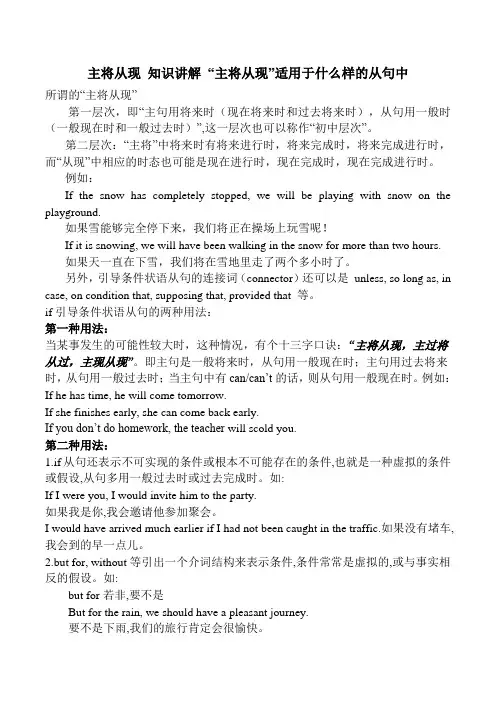
主将从现知识讲解“主将从现”适用于什么样的从句中所谓的“主将从现”第一层次,即“主句用将来时(现在将来时和过去将来时),从句用一般时(一般现在时和一般过去时)”,这一层次也可以称作“初中层次”。
第二层次:“主将”中将来时有将来进行时,将来完成时,将来完成进行时,而“从现”中相应的时态也可能是现在进行时,现在完成时,现在完成进行时。
例如:If the snow has completely stopped, we will be playing with snow on the playground.如果雪能够完全停下来,我们将正在操场上玩雪呢!If it is snowing, we will have been walking in the snow for more than two hours.如果天一直在下雪,我们将在雪地里走了两个多小时了。
另外,引导条件状语从句的连接词(connector)还可以是unless, so long as, in case, on condition that, supposing that, provided that 等。
if引导条件状语从句的两种用法:第一种用法:当某事发生的可能性较大时,这种情况,有个十三字口诀:“主将从现,主过将从过,主现从现”。
即主句是一般将来时,从句用一般现在时;主句用过去将来时,从句用一般过去时;当主句中有can/can’t的话,则从句用一般现在时。
例如:If he has time, he will come tomorrow.If she finishes early, she can come back early.If you don’t do homework, the teacher will scold you.第二种用法:1.if从句还表示不可实现的条件或根本不可能存在的条件,也就是一种虚拟的条件或假设,从句多用一般过去时或过去完成时。
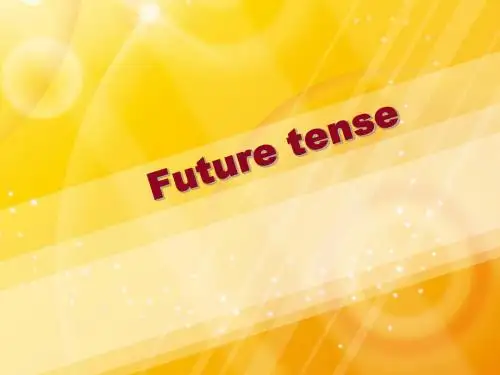
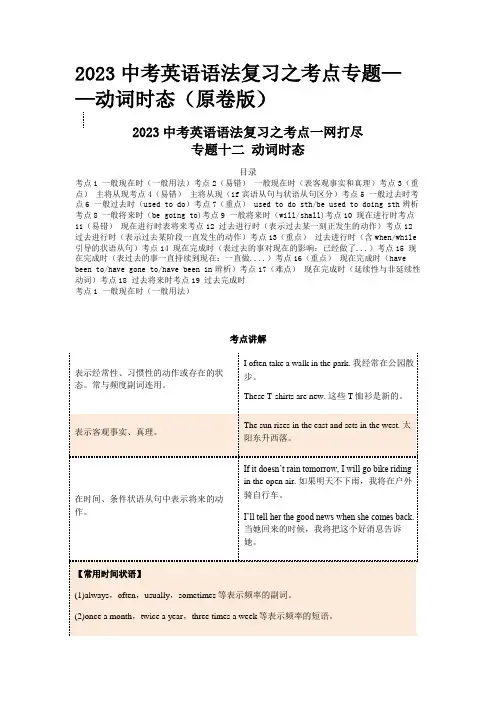
2023中考英语语法复习之考点专题——动词时态(原卷版)2023中考英语语法复习之考点一网打尽专题十二动词时态目录考点1 一般现在时(一般用法)考点2(易错)一般现在时(表客观事实和真理)考点3(重点)主将从现考点4(易错)主将从现(if宾语从句与状语从句区分)考点5 一般过去时考点6 一般过去时(used to do)考点7(重点) used to do sth/be used to doing sth辨析考点8 一般将来时(be going to)考点9 一般将来时(will/shall)考点10 现在进行时考点11(易错)现在进行时表将来考点12 过去进行时(表示过去某一刻正发生的动作)考点12 过去进行时(表示过去某阶段一直发生的动作)考点13(重点)过去进行时(含when/while 引导的状语从句)考点14 现在完成时(表过去的事对现在的影响:已经做了...)考点15 现在完成时(表过去的事一直持续到现在:一直做....)考点16(重点)现在完成时(have been to/have gone to/have been in辨析)考点17(难点)现在完成时(延续性与非延续性动词)考点18 过去将来时考点19 过去完成时考点1 一般现在时(一般用法)考点讲解1.(2021·上海松江·二模)Tim likes watching films. He _________ to the cinema with his girlfriend once a week.A.goes B.is going C.has gone D.will go2.(2020·湖北恩施)I hear that it often ________ in Sichuan and there are usually floods, especially in summer.A.rains B.rained C.will rain3.(2021·北京房山·二模)Mary ________ her grandparents every weekend.A.visits B.was visiting C.is visiting D.has visited4.(2021·广西桂林)The zebra eats grass, but it ________ eat meat.A.doesn’t B.didn’t C.don’t5.(2021·黑龙江·齐齐哈尔市碾子山区教师进修学校一模)—Do you like the flower? —Yes. It ________ sweet.A.is smelling B.smells C.smelt考点2(易错)一般现在时(表客观事实和真理)考点讲解精选练习6.(2020·天津红桥·二模)In the past, people didn't know the earth ________round the sun. A.going B.goes C.will go D.go7.(2021·吉林长春·模拟预测)The teacher told us that the sun ________ in the east. A.rises B.rise C.rose D.rising考点3(重点)主将从现考点讲解精选练习8.(2021·四川乐山)—What’s your plan for the summer holiday?—I’ll go to Chendu as soon as the school term ___________.A.end B.ends C.will end9.(2021·广西河池)Mrs. Green will take her son to the amusement park if she ________ the tickets.A.got B.gets C.is getting D.will get10.(2021·辽宁丹东)We can’t avoid traffic accidents unless everyone ________ the rules. A.follows B.breaks C.will follow D.will break考点4(易错)主将从现(if宾语从句与状语从句区分)考点讲解精选练习11.(2021·辽宁鞍山)—Tina wants to know if you ________ to the park with us tomorrow. —I’d love to. But if it ________, I may go to the library instead.A.go; will rain B.go; rains C.will go; rains D.will go; will rain12.(2020·黑龙江牡丹江)—I wonder if we ________a farewell party next week. —If we________it, I will call you.A.will have ; have B.have;will have C.will have; will have13.(2021·黑龙江哈尔滨)—I wonder if you ________ us for the English party tomorrow. —If I ________ free, I will go with you.A.will join, am B.will join, will be C.join, am考点5 一般过去时考点讲解精选练习14.(2021·广西贵港)—Where does Bill live? —He ________ me his address, but I can’t remember it now.A.tells B.told C.is telling D.will tell15.(2021·四川达州)— Alice has gone out. — Oh, has she? What time ________ she________?A.has; gone B.will; go C.did; go D.is; going16.(2021·江苏徐州)In my school days, I ________ a lot of reading in English every day. That was how I learned English at that time.A.do B.did C.have done D.will do17.(2021·重庆)Last Sunday my brother and I ________ our grandparents.A.will visit B.visits C.visit D.visited18.(2021·内蒙古兴安盟)— Have you ever been to Shanghai? — Of course. Actually, I________ there for six years, but now I live in Beijing.A.worked B.was working C.would work D.have worked考点6 一般过去时(used to do)考点讲解精选练习19.Mr Jiang isn’t as busy as before because there ___________no home robot to help him.A.used to be B.may be C.used to have D.may have20.I ________ in this small mountain village when I was a child.A.use to live B.used to living C.used to live D.used to life21.(2019·江苏镇江)Yao Ming, a basketball giant , ___________ water polo when he was young.A.is playing B.used to play C.is used to playing D.was playing考点7(重点) used to do sth/be used to doing sth辨析考点讲解精选练习22.(2020·湖南益阳)Diana used to _________ to work, but now she is used to ________ because the road is crowded and she wants to keep fit.A.drive; walk B.drive; walking C.driving; walk23.Dick __________ in America, but he has been ___________ Chinese food since he moved to China.A.used to live; used to eating B.is used to live; used to eat C.is used to live; used to eating D.used to living; used to eat24.—How does your brother go to school? —He ___________ ride a bike, but now he__________ there to keep fit.A.used to; is used to walk B.used to; is used for walking C.was used to; is used to walking D.used to; is used to walking考点8 一般将来时(be going to)考点讲解一般将来时表示将来某个时间要发生的动作,事情或存在的状态,也表示将来经常或反复发生的动作或事情。
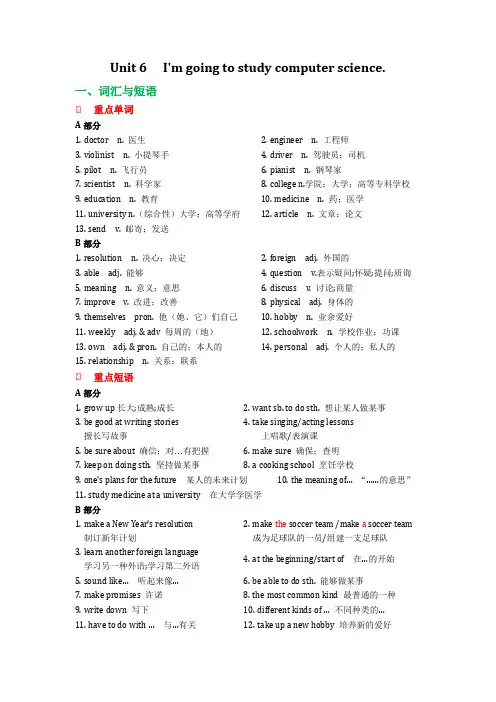
Unit 6 I'm going to study computer science. 一、词汇与短语● 重点单词A部分1.doctor n. 医生2.engineer n. 工程师3.violinist n. 小提琴手4.driver n. 驾驶员;司机5.pilot n. 飞行员6.pianist n. 钢琴家7.scientist n. 科学家8.college n.学院;大学;高等专科学校cation n. 教育10.medicine n. 药;医学11.university n.(综合性)大学;高等学府12.article n. 文章;论文13.send v. 邮寄;发送B部分1.resolution n. 决心;决定2.foreign adj. 外国的3.able adj. 能够4.question v.表示疑问;怀疑;提问;质询5.meaning n. 意义;意思6.discuss v. 讨论;商量7.improve v. 改进;改善8.physical adj. 身体的9.themselves pron. 他(她、它)们自己10.hobby n. 业余爱好11.weekly adj. & adv 每周的(地)12.schoolwork n. 学校作业;功课13.own adj. & pron. 自己的;本人的14.personal adj. 个人的;私人的15.relationship n. 关系;联系● 重点短语A部分1.grow up长大;成熟;成长2.want sb. to do sth. 想让某人做某事3.be good at writing stories 擅长写故事4.take singing/acting lessons上唱歌/表演课5.be sure about 确信;对…有把握6.make sure 确保;查明7.keep on doing sth. 坚持做某事8.a cooking school 烹饪学校9.one's plans for the future 某人的未来计划10.the meaning of… “……的意思”11.study medicine at a university 在大学学医学B部分1.make a New Year's resolution 制订新年计划2.make the soccer team /make a soccer team成为足球队的一员/组建一支足球队3.learn another foreign language学习另一种外语;学习第二外语4.at the beginning/start of 在…的开始5.sound like… 听起来像…6.be able to do sth. 能够做某事7.make promises 许诺8.the most common kind 最普通的一种9.write down 写下10.different kinds of … 不同种类的…11.have to do with … 与…有关12.take up a new hobby 培养新的爱好13.start an exercise program开始一个锻炼计划14.make a weekly plan for schoolwork为学校的学习做周计划15.a time for doing sth. 做某事的时间16.improve our lives 改善我们的生活● 重点句子A部分1.--What do you want to be when you grow up? --I want to be an engineer.当你长大的时候,你想当什么?我想当一名工程师。
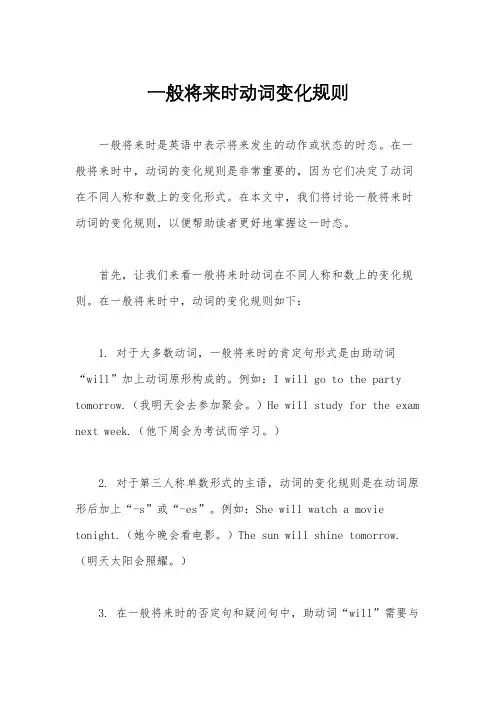
一般将来时动词变化规则一般将来时是英语中表示将来发生的动作或状态的时态。
在一般将来时中,动词的变化规则是非常重要的,因为它们决定了动词在不同人称和数上的变化形式。
在本文中,我们将讨论一般将来时动词的变化规则,以便帮助读者更好地掌握这一时态。
首先,让我们来看一般将来时动词在不同人称和数上的变化规则。
在一般将来时中,动词的变化规则如下:1. 对于大多数动词,一般将来时的肯定句形式是由助动词“will”加上动词原形构成的。
例如:I will go to the party tomorrow.(我明天会去参加聚会。
)He will study for the exam next week.(他下周会为考试而学习。
)2. 对于第三人称单数形式的主语,动词的变化规则是在动词原形后加上“-s”或“-es”。
例如:She will watch a movie tonight.(她今晚会看电影。
)The sun will shine tomorrow.(明天太阳会照耀。
)3. 在一般将来时的否定句和疑问句中,助动词“will”需要与“not”或主语进行缩写。
例如:I will not go to the party tomorrow.(我明天不会去参加聚会。
)Will you study for the exam next week?(你下周会为考试而学习吗?)除了以上的变化规则外,一般将来时中还有一些特殊动词的变化形式需要注意。
例如,be动词的一般将来时形式为“will be”,have动词的一般将来时形式为“will have”,而情态动词的一般将来时形式为“情态动词+动词原形”。
另外,一些不规则动词在一般将来时中的变化形式也需要特别记忆和掌握。
总之,一般将来时动词的变化规则是学习英语时态的重要内容之一。
掌握这些规则可以帮助我们正确地运用一般将来时,使我们的英语表达更加准确和流利。
因此,希望读者能够通过本文对一般将来时动词的变化规则有更清晰的认识,并在日常学习和交流中灵活运用这些规则。
初中英语必考高频考点Will 和be going to的用法辨析初中英语八大时态中,将来时是相对容易掌握的一个,因为没有什么词性的变化。
但是又因为Will 和be going to在使用上的一些差异,导致好多同学都容易混淆,不知道什么时候如何去正确使用Will 和be going to。
但be going to的时态语法考察又是初中英语常常考察的体型,会经常出现在各种完形阅读中,大家一定要引起重视。
现就Will 和be going to的一些区别简单区分表述一、在表示将来发生的事情时,二者的区别主要是:1、be going to用于主观判断,及说话人主观上计划或安排将要去做的事情will则多用于客观的情况,即客观上将要发生的事情.如:I am not going to meet him.我不打算去见他It will be rainy tomorrow.明天会下雨2、be going to表示近期、眼下就要发生的事情will表示的将来时间则较远一些如:He's going to do it right away他马上就去做.Will he arrive on time next time?下次他会按时到吗?二、可表示说话人按照他的意图将要发生或进行的动作时,各有侧重若表示没有经过事先计划或考虑,而是在说话的当时临时想到的意图或临时作出的决定时,则要用wilL.若表示经过事先考虑好的意图时,要用be going to.如:I will open the door 我去开门(事先没经过考虑)I‘ m going to meet him at the railway station.我去火车站接他.(已经过考虑)三、在有条件从句的主句中一般不用be going to,而多用will,因为此时多少带有些意愿.(主将从现)如:l won't go if she doesn't come.她不来,我就不去四、在正式的通知(如新闻媒体公布的官方消息,气象预报等)中用Will结构.如:Beijing will be cloudy with the temperature from eighteen to twenty six.北京阴,气温十八到ニ十六摄氏度五、表示有迹象表明要发生某事,只用be going to,不用Wwil.如:Look at the clouds, it s going to be another storm.瞧瞧这些云,暴风雨又要来了初中英语高频考点词in the end和at the end of辨析辨析in the end, at the end of 和by the end of(1) at the end of 表示“在······的末端,在······的尽头”,既可以用来指时间,又可以用来指空间.反义:at the beginning of “在······的开始”=start如:There is a new library at the end of the street.在这街的尽头有一家新图书馆。
主将从现情况小结主将从现问题是中考考点之一。
它是指在时间状语从句和条件状语从句中,如果主句是一般将来时,从句用一般现在时替代一般将来时。
常见的有以下三种情况:一、条件状语从句、时间状语从句的主句是一般将来时,那么从句常常用一般现在时。
如:When I grow up, I’ll be a nurse and look after patients.我长大后要当一名护士,照顾病人。
If tomorrow is rainy,we won't go.二、如果主句是祈使句,那么从句通常要用一般现在时。
如:Don’t laugh at me when I make a mistake.我犯错误的时候不要笑话我。
三、如果主句是含有情态动词的一般现在时,根据需要从句多用一般现在时。
如:You should be quiet when you are in the reading room.在阅览室时应保持安静。
四、as soon asAs soon as she gets here, I’ll tell her about it.五.UnlessI will not go there unless I am free that day.六、untilI won’t go out until the rain stops.练习单项选择(中考题):1 If he ___ harder , he will catch up with us soon.(04 北京)A studyB studiesC will studyD studied2 I will go swimming with you if I ___ free tomorrow.(04哈尔滨)A will beB shall beC amD was3 If you ___ a chance to study in a foreign country ,just take it .(04 苏州)A gettingB had gotC will getD get4 Don’t leave until he ___ back.()A have comeB comesC will comeD came5 “Shall we have the volleyball match tomorrow?”“ Oh, it will be put off if it ____.(04 黄冈)A snowsB is snowingC snowedD will snow6 -Tell him about the news when he ____ ,John. -Yes, I will.(04 宁波)A comesB will comeC wouldD is coming7 Tomorrow we will go to the city park____ it is sunny.(05 安徽)A as soon asB whenC ifD as8 Please don’t leave until your teacher ___back.(05河南)A will comeB cameC comesD is coming9 I want to know if there ___a sports meeting next month . If they ___ it , I must get ready for it。
主将从现,主过将从过,主现从现-if句上个学期,我们曾经学过由if 引导的句⼦,你还记得吗?对了,“ I’ll not go to the zoo if it rains tomorrow. ( 假如明天下⾬,我就不去动物园。
) You can come to the party if you don’t wear jeans.(如果你不穿⽜仔裤,你就能来舞会。
)” 这个学期⼜在本单元见到了似曾相识的同样由if引导的句⼦,⽐如:“If I won the lottery, I would give it to medical research. (假如我赢了彩票的话,我就捐给医学研究。
) If I were you, I would wear jeans and T-shirt.(如果我是你,我就穿⽜仔裤和T恤。
)”这两个单元学到的句⼦都是由if引导的。
那么,它们有什么区别呢?对了,分两种情况:1.something may possible happen某事发⽣的可能性较⼤。
这种情况,有个⼗三字⼝诀:“主将从现,主过将从过,主现从现”。
即主句是⼀般将来时,从句⽤⼀般现在时;主句⽤过去将来时,从句⽤⼀般过去时;当主句中有can/can’t的话,则从句⽤⼀般现在时。
例如:If he has time, he will come tomorrow.If she finishes early, she can come back early.If you don’t do homework, the teacher will scold you.2.it is just imaginary, and nothing will happen 某事只是想象的,并不会发⽣,或者发⽣的可能性很⼩。
则要⽤我们常说的虚拟语⽓。
例如:If he were kind, he would help me with it. (He isn’t.)If I had more money, I would buy all of them. (I don’t.)If he were generous, he would give us a good treat. (He isn’t.)If you were tired, you would find a good job. (You aren’t.)If I were you, I would buy the dearest one. ( I am not.)任务设计任务I. 请⽤正确的形式填空。
高一英语语法(2-3):动词的时态之一般将来时、过去将来时、将来完成时一、一般将来时(will work):一般将来时的5种表达方式。
1.“shall / will + V原”是将来时的最普通的表达方式,表示从现在来看以后要发生的动作或存在的状态,指事物的固有属性或必然趋势。
如:We __________ (go) to ask Miss Chen for help. (shall和will表达一般将来时有何区别?)2.“am / is / are going to + V原”多用于口语中,表示“打算或计划要做某事”。
此外,还可以表示说话人根据已有的事实或迹象,对未来进行推断。
如:They __________ (meet) outside the school gate.(打算或计划要做某事)(根据已有的迹象,对未来进行推断)3.“am / is / are about to + V原”表示“即将……”,它不与表示时间的副词或时间状语连用。
如:The English evening __________ (start).4.“am / is / are to + V原”表示“按计划、安排即将发生的动作”,还可以表示“吩咐、命令、禁止”等,与表示时间的副词或时间状语连用。
如:到10(命令)5.“am / is / are due to +V原”表示“按计划或时间表将要发生某事”。
如:The talk __________ (last) for five days. 会谈(按计划)将持续5天。
The race __________ (start) in ten minutes. (按时间表)还有10分钟比赛就该开始了。
现在进行时有时与某些表示瞬间动作的动词连用,可表示按计划、安排将要发生的动作。
常见动词有go, come, start, leave, stay, return, arrive, begin, take, meet等。
一般将来时(一)含义:将来要发生的动作或事情。
(二)动词形式:will+动词原形/be going to+动词原形/be about to do(三)关键词:in the future(将来);tomorrow(明天);next week/month/year....(下...);at once(马上);具体语境......例句:We will have dinner at the new restaurant near our school tonight.今晚我们将在学校附近的新餐馆吃饭。
例句:I am sure there will be more trees in our country in the future.我相信我们国家将来会有更多的树。
(四)现在进行时表将来时下列动词的现在进行时表示将来时:go,come,fly,leave,start,begin,finish,end,arrive等。
例句:she is leaving for Wuhan tomorrow.(五)一般现在时表将来1、下列动词come,go,arrive,leave,start,begin,return的一般现在时可以表示将来,主要用来表示在时间上已确定或安排好的事情。
例句:The train leaves at six tomorrow morning. 火车明天上午六点开。
例句:When does the bus star? It stars in ten minutes. 汽车什么时候开?十分钟后。
2、以here,there等开始的倒装句,表示动作正在进行。
Here comes the bus. = The bus is coming. 车来了。
There goes the bell. = The bell is ringing. 铃响了。
3、在时间或条件句中。
When Bill comes(不是will come), ask him to wait for me. 比尔来后,让他等我。